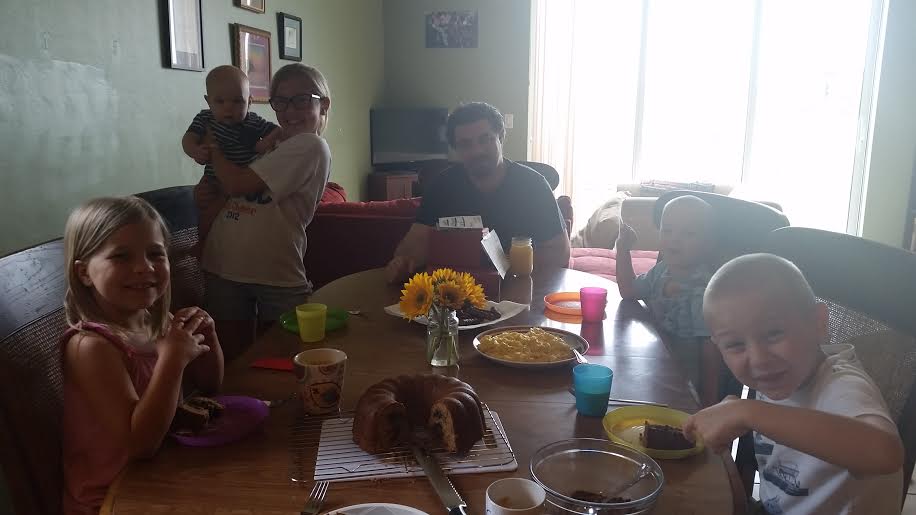This is part 2 of Melanie’s series on how to catechize young children. This part, for me, was both amazing and humbling to read. Every sentence felt like a revelation, like I was finally understanding something I’ve known instinctively for years but never really known.
But if you’re like me, you’ll read this with a growing awareness of just how many opportunities you’ve missed. My eldest, Sienna, was on my mind throughout this reading, and I came to the end of this post with the sinking realization that rather than nurture and encourage her innate spirituality, I’ve often stifled it. I haven’t given it an environment in which to flourish and bear fruit, nor have I given her spiritual development the time and attention that it deserves.
If that’s you, don’t fret. It won’t do us any good to lament what we’ve lost; Melanie is giving us a chance to start again. Bear in mind that children are flexible. They adapt to change quickly, and they respond wonderfully to even the feeblest attempts we make to show them the glory of God. This past Easter, we spent a great deal of time talking about Jesus’ death and resurrection. For weeks afterward Sienna, who has something of Joan of Arc about her, would sword-fight her way down the hall, “killing the Romans and protecting Jesus.” Perhaps not the most appropriate response, but it just goes to show how completely children will enter into the spiritual life if we give them what they need to do so.
***
You may well be wondering when I’m going to get to the stuff about what I do rather than the blathering about my theories of catechetics. The thing is although I’ll never be a philosopher—I’m too much of a divergent thinker and logic isn’t my strong suit—still, I do believe in first principles and I think a list of what I do isn’t much use at all unless I first explain why I do what I do. In short, you’re stuck with me doing it my way, long-winded though it may be.
The Religious Potential of the Child
We’re so stuck in the religious education model of faith formation that we tend to think that formation really doesn’t begin till they’re school aged. Or at least we think that we have to wait until they can speak. We think of catechesis in terms of teaching them to say their prayers. We think of it in terms of them understanding the prayers they say.
But that’s all wrong. Catechesis isn’t about teaching prayers and the catechism. Catechesis is about forming a relationship. Catechesis doesn’t begin when a child can understand the word “God.” No, catechesis begins the day they’re born. Or maybe it begins even earlier. Maybe catechesis starts the day you had a positive pregnancy test. That’s when you start praying and sweating about getting them to heaven. I’m maybe exaggerating just a bit but it was when I was pregnant with my first child that I realized that my daughter already had a relationship with God right then and there in the womb.
All Ye Blastocysts, Bless the Lord
One day while I was napping and thinking about the invisible life inside of me I imagined that there in the dark and quiet of the womb she was somehow singing with the angels and dancing with the stars. Time and space don’t matter with God. He is everywhere. This is why I adore Regina Doman’s beautiful picture book Angel in the Waters, inspired by her younger sister’s memory of her guardian angel being there with her in utero. Science has shown that a newborn can recognize his mother’s voice and his father’s and siblings’ too. Why then should he not also recognize the presence of his eternal Father just as John the Baptist recognized the infant Christ even in the womb and leapt for joy?
In the psalms and canticles we are told again and again that all creation gives God praise. My favorite canticle in the Divine Office is from the book of Daniel. It appears in Morning Prayer for Sunday Week One and it comes up again and again and again. With the holy children in the fiery furnace we pray: Sun and moon, bless the Lord… Mountains and hills, bless the Lord… Birds of the air, bless the Lord… dolphins and all water creatures, bless the Lord. If every kind of animal worships, God, if the very rocks and hills give him praise, then how much more does the baby in the womb who from the moment of her creation has an immortal soul?
Praying with Them
If all creation gives God praise, my job as a parent isn’t so much to teach my children to praise him as to praise him with them. An infant is not a piece of baggage that you tote to Mass. He is not a distraction from prayer, an obstacle to prayer. Instead he is a partner in our prayer, a fellow worshiper who we can help to worship more truly, more deeply by helping him to become conscious of his worship. We begin by being conscious of it ourselves as we recognize in him not only the capacity for worship; but the fact that he already is worshipping. Then we can begin to guide him in learning the language of worship.
Teaching the Language of Worship
At the same time that we are teaching baby how to communicate to other people, we should also be teaching him how to communicate with God. Children are born communicators. One of the first tasks of parenting is learning how to understand what our baby is telling us. We learn how to tell when he’s hungry or wet or sleepy or in pain and we learn to respond.
Children are also born with the capacity to acquire language. It takes no special skill on the part of a parent to teach him how to speak his native language. All we have to do is provide him with a language-rich environment. We speak to him, speak with him, speak near him, and one day we realize that the child has been listening, that he understands the words we are speaking.
Likewise, children are born with a capacity to worship God. We don’t so much teach them about God as provide a worship-rich environment. We pray and invite him to pray with us and soon we realize that he is praying on his own. At first it is just a word—In Ben’s case it was the name Jesus that sounds like Jeesh on his toddler lips—a word and perhaps an action, like kissing a crucifix.
The Essence of Prayer
Just one word; but make no mistake that name is a powerful prayer. It is the name above every other name. It is the name that saves. And to hear it on the lips of my infant son is to be on the threshold of a great mystery: on the lips of infants and babes you have received perfect praise. It is also to begin to learn how to pray myself. Unless you become like children you cannot enter the kingdom of heaven. There is a great simplicity here, and yet also a profound mystery.
Just as when he learns to say “mama” my son is merely giving a voice to that which he already knew from the moment of his birth, speaking a name for that person whose voice and smell he recognized in his first moments in the outside world, so too with the name Jesus. I was merely giving him a name for something he already knew, showing him a sign and helping him put a face to a presence that he already had a relationship with from the moment of his conception. I am like a midwife attending a birth. I did not create the baby nor am I the one doing the real work. I guide and help the process but it is the child himself who makes the connections, who forms the relationship, in whose life the Spirit will bring forth graces.
I think this is the heart of what I have to say about the catechesis of very young children. Everything else I’ve got to impart is details, the particular details of how we have gone about guiding our children. Every parent is going to have their own details, every mother will go about this task in a little different way. My way is probably not going to be your way. But my hope is that by sharing my way I may inspire you to seek out your own path. In the next part of this series I’ll tell you about some of the tools I’ve used and you may or may not find them helpful. But even if you don’t I hope you will be inspired to find what will work for you and your family.











